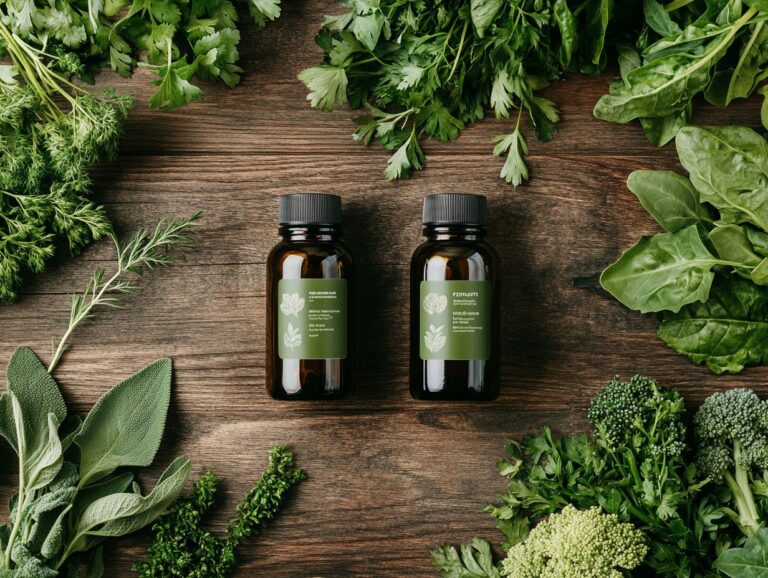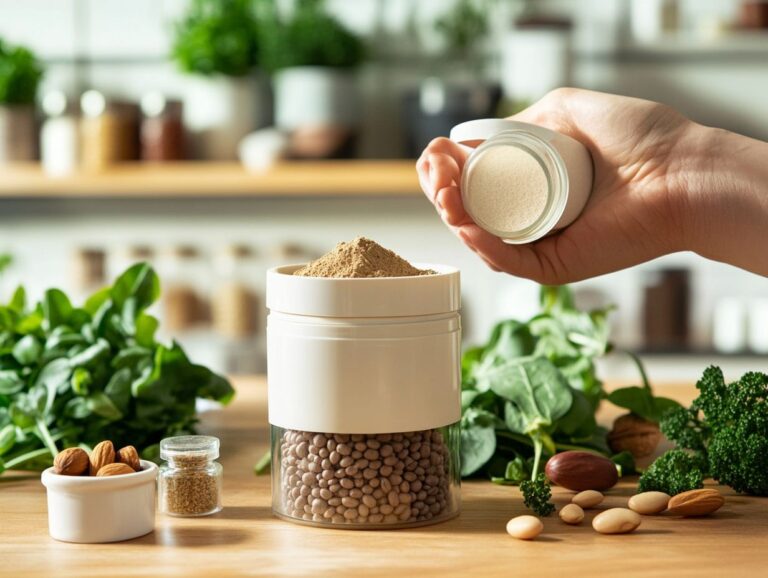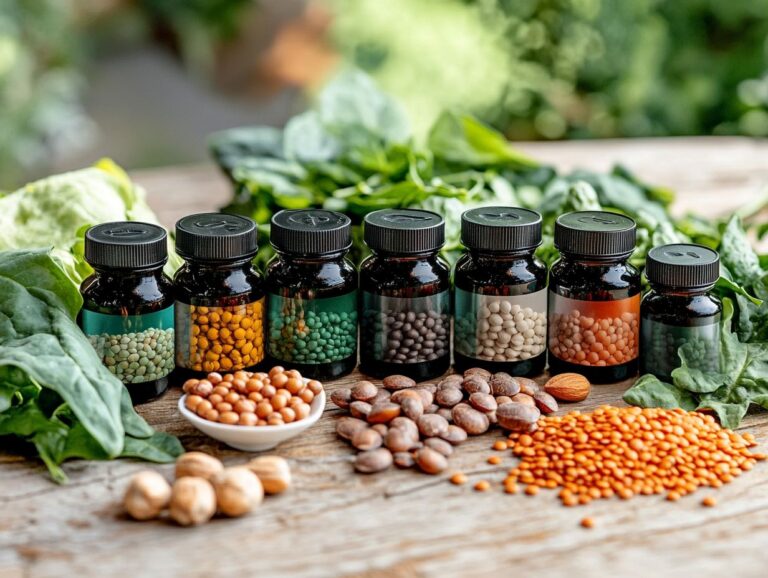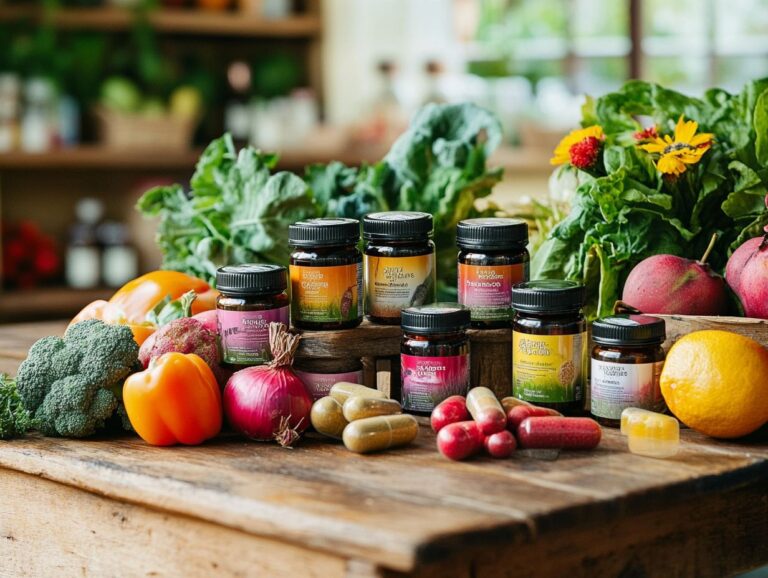In the pursuit of vegan muscle growth, many fitness enthusiasts are discovering the benefits of vegan supplements. These plant-based options offer essential nutrients that support strength building and recovery without relying on animal products. It is crucial for anyone looking to optimize their fitness journey and understand the science of muscle growth to determine which supplements are best for this purpose, their advantages, and how to effectively incorporate them into their routine. This article will explore the essential nutrients, highlight top vegan supplements, and provide practical tips for integrating them into your diet.
Key Takeaways:
- Plant-based supplements are essential for muscle growth as they provide necessary nutrients for building and repairing muscle tissue, increasing energy and endurance, and reducing inflammation and soreness. These healthy vegan supplements ensure a well-rounded approach to muscle development.
- The best vegan supplements for muscle growth include plant-based protein powders, BCAAs, creatine, beta-alanine, and iron.
- To incorporate vegan supplements into your diet, consult with a registered dietitian, read labels and dosage recommendations, and stay consistent with taking supplements.
What Are Vegan Supplements for Muscle Growth?
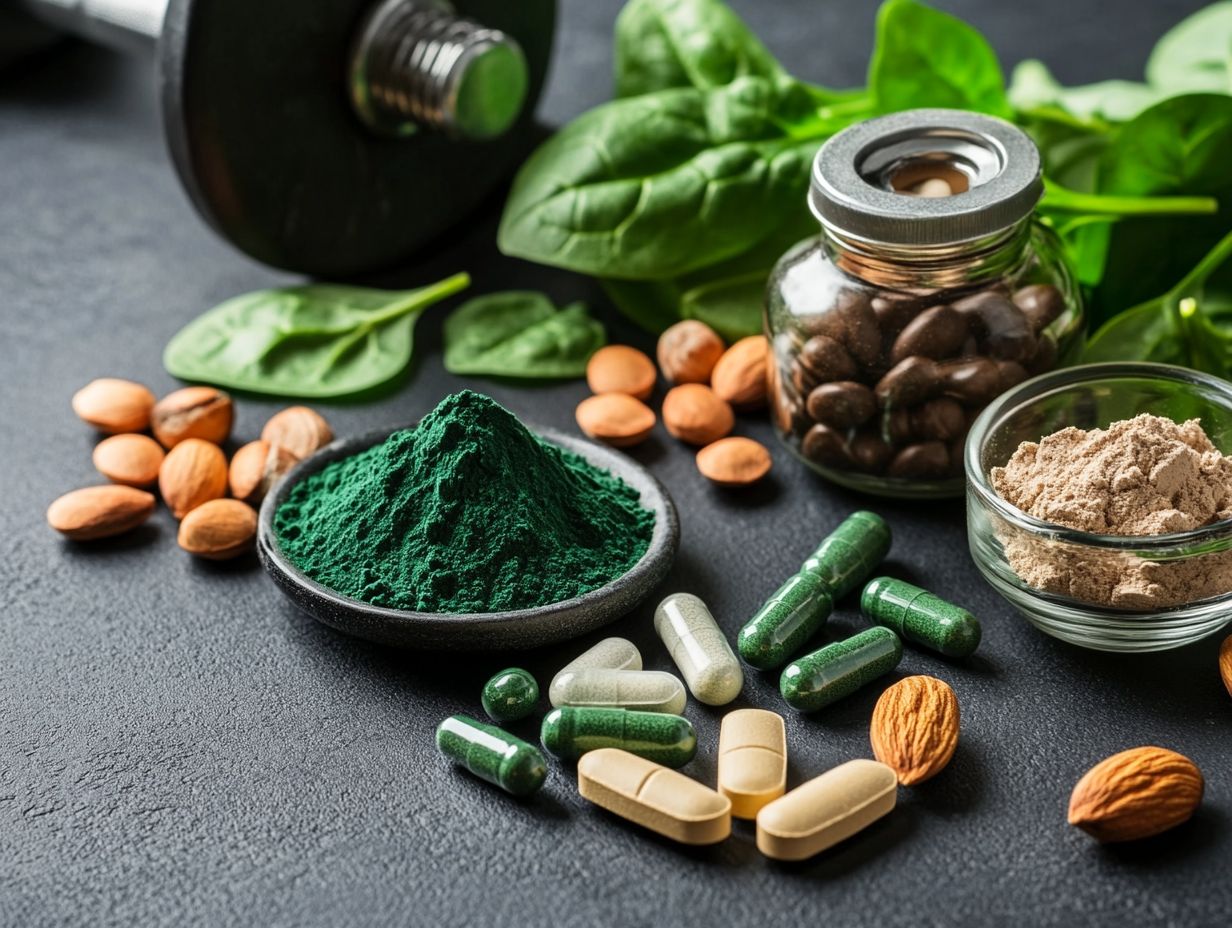 Vegan supplements for muscle growth are essential tools that support the science of muscle development within a plant-based diet. These supplements provide athletes and fitness enthusiasts with key nutrients that enhance muscle repair, growth, and strength. Essential amino acids, vitamins, and minerals play a crucial role in this process. While a balanced vegan lifestyle can offer adequate nutrition, such as through vegan protein sources like lentils, chickpeas, and quinoa, these supplements help fill any gaps that may arise from the absence of animal-based products. By understanding how these supplements work and identifying the most effective ones, like vegan protein powders and omega-3 supplements, individuals can ensure they meet their protein intake requirements and adequately boost muscle protein synthesis, resulting in improved muscle growth and recovery. Overall, these supplements contribute significantly to enhancing both muscle growth and recovery through proper nutrition and supplementation.
Vegan supplements for muscle growth are essential tools that support the science of muscle development within a plant-based diet. These supplements provide athletes and fitness enthusiasts with key nutrients that enhance muscle repair, growth, and strength. Essential amino acids, vitamins, and minerals play a crucial role in this process. While a balanced vegan lifestyle can offer adequate nutrition, such as through vegan protein sources like lentils, chickpeas, and quinoa, these supplements help fill any gaps that may arise from the absence of animal-based products. By understanding how these supplements work and identifying the most effective ones, like vegan protein powders and omega-3 supplements, individuals can ensure they meet their protein intake requirements and adequately boost muscle protein synthesis, resulting in improved muscle growth and recovery. Overall, these supplements contribute significantly to enhancing both muscle growth and recovery through proper nutrition and supplementation.
Why Are Vegan Supplements Important for Muscle Growth?
Vegan supplements support muscle growth by addressing nutrient deficiencies that can arise from a strictly plant-based diet. Although a vegan diet can be nutritionally complete, many individuals struggle to meet their protein intake requirements without supplementation. Essential nutrients such as vitamin B12, iron, zinc, and omega-3 fatty acids are often limited in vegan diets, potentially hindering muscle recovery and growth. A vitamin B12 deficiency, for instance, can impact energy production and muscle health. By filling these nutritional gaps, vegan supplements ensure that athletes have the necessary building blocks for muscle protein synthesis and overall health.
What Nutrients Are Essential for Muscle Growth?
The key nutrients essential for muscle growth and their specific contributions to a vegan diet include the following:
- Essential Amino Acids: Amino acids serve as the building blocks of proteins, which are crucial for muscle tissue. Essential amino acids cannot be produced by the body and must be obtained through diet or supplements, such as plant-based protein options. A deficiency in amino acids can hinder the body’s ability to repair muscle tissue, potentially leading to atrophy and other adverse effects on muscle health.
- Vitamins and Minerals: Important vitamins and minerals for muscle growth include vitamin B12, iron, zinc, and calcium. Vitamin B12 is vital for energy production and red blood cell formation, and its deficiency is associated with muscle weakness. Iron plays a key role in energy and oxygen transport to muscles, while zinc supports muscle growth and recovery. Calcium is crucial for bone health and muscle function. Vegans can obtain B12 from fortified nutritional yeast and plant-based milks. Iron is found in leafy greens, lentils, and pumpkin seeds, whereas zinc is present in whole grains, nuts, and legumes.
- Omega-3 Fatty Acids: Omega-3 fatty acids, part of essential fatty acids, are renowned for their anti-inflammatory properties, which can help reduce muscle soreness and enhance recovery after intense workouts. This is particularly important for athletes aiming to maximize muscle growth. While omega-3s are commonly found in fish, vegans can obtain them from flaxseeds, chia seeds, and algae-derived omega-3 supplements.
Examples of vegan foods that provide these key nutrients for a well-balanced diet include lentils, chickpeas, and quinoa.
What Are the Best Vegan Supplements for Muscle Growth?
The best vegan supplements for muscle growth include a range of plant-based products designed to enhance performance and support recovery. These include options like creatine monohydrate and beta-alanine benefits that directly influence muscle repair growth and energy production.
- Plant-Based Protein Powders: Popular options such as pea protein and brown rice protein powders provide essential amino acids necessary for muscle protein synthesis. This process is crucial for muscle growth and repair following exercise.
- Branched-Chain Amino Acids (BCAAs): Comprising leucine, isoleucine, and valine, BCAAs are frequently taken in supplement form by athletes due to their role in muscle metabolism. They have been shown to reduce muscle soreness and improve recovery, particularly after strenuous exercise.
- Creatine: Naturally occurring in the body, creatine is often consumed as a powder supplement. It is one of the most researched and effective supplements for athletes, known for enhancing strength and power output.
- Beta-Alanine: This amino acid helps increase carnosine levels in muscles and is commonly taken in powder form by athletes. Studies have demonstrated that beta-alanine supplements can improve exercise endurance.
- Iron: Particularly important for female athletes, iron is another common vegan supplement for muscle growth. It is essential for the proper functioning of hemoglobin and myoglobin, proteins in red blood cells responsible for oxygen transport. Iron-rich supplements, especially when combined with other vitamins, can help maintain optimal energy levels in athletes.
1. Plant-based Protein Powders
Plant-based protein powders are advantageous for muscle recovery as they enable individuals to easily increase their protein intake, which is essential for this process. These powders are derived from various vegan protein sources, such as lentils, chickpeas, and quinoa, and they provide a complete amino acid profile crucial for muscle growth and repair. Furthermore, many people find plant-based protein powders to be more easily digestible than traditional protein powders, making them a popular choice for muscle recovery. Pea and brown rice protein powders are common options due to their high digestibility and low allergenic potential. They can be seamlessly incorporated into a variety of meals, ranging from protein shakes after workouts to oatmeal and baked goods. Different types of plant-based proteins offer unique benefits; for instance, pea protein is high in branched-chain amino acids (BCAAs), which are vital for muscle recovery, while hemp protein contains omega-3 fatty acids that promote overall health. By diversifying their protein sources, individuals can better meet their protein needs and enhance their muscle-building efforts, supporting their vegan lifestyle.
2. BCAAs
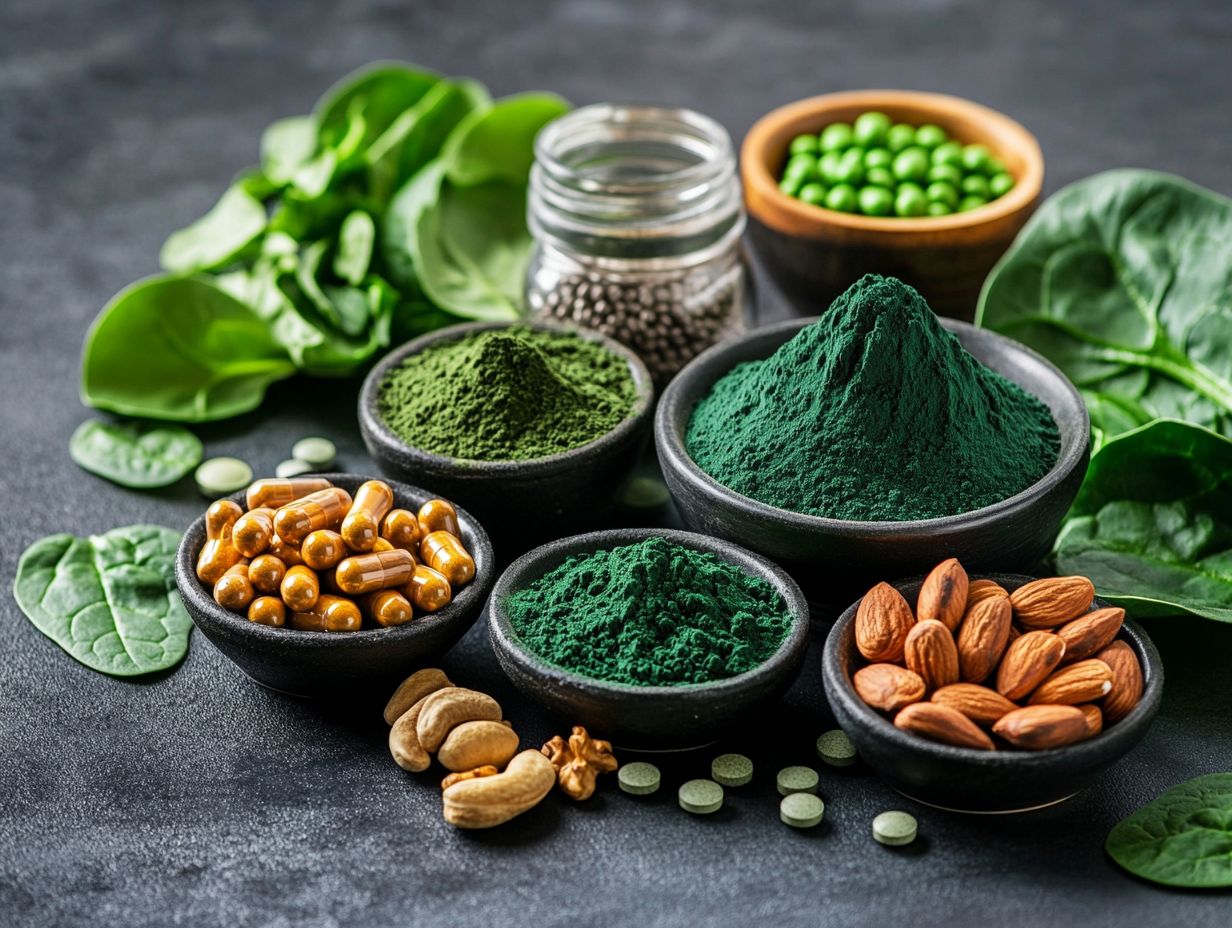 Branched-chain amino acids (BCAAs) are essential for muscle growth, as they consist of three critical amino acids vital for muscle recovery and protein synthesis: leucine, isoleucine, and valine. These amino acids help reduce muscle soreness and may enhance exercise performance. Consequently, BCAAs are commonly used as a supplement among athletes and can aid in optimal recovery after strenuous exercise. BCAAs function by stimulating muscle protein synthesis, which is crucial for muscle repair and growth. Leucine, in particular, has been identified as a key regulator of this process, acting as a trigger to initiate muscle protein synthesis. A typical recommendation for individuals looking to build muscle or accelerate recovery is to take a dose of 5-10 grams of BCAAs before or after a workout. For vegans, there may be concerns regarding protein intake. While BCAAs can be obtained from various food sources, including legumes, nuts, and whole grains, individuals following a vegan diet should assess their protein intake to ensure that their muscle recovery and growth requirements are being met without the need for additional supplementation.
Branched-chain amino acids (BCAAs) are essential for muscle growth, as they consist of three critical amino acids vital for muscle recovery and protein synthesis: leucine, isoleucine, and valine. These amino acids help reduce muscle soreness and may enhance exercise performance. Consequently, BCAAs are commonly used as a supplement among athletes and can aid in optimal recovery after strenuous exercise. BCAAs function by stimulating muscle protein synthesis, which is crucial for muscle repair and growth. Leucine, in particular, has been identified as a key regulator of this process, acting as a trigger to initiate muscle protein synthesis. A typical recommendation for individuals looking to build muscle or accelerate recovery is to take a dose of 5-10 grams of BCAAs before or after a workout. For vegans, there may be concerns regarding protein intake. While BCAAs can be obtained from various food sources, including legumes, nuts, and whole grains, individuals following a vegan diet should assess their protein intake to ensure that their muscle recovery and growth requirements are being met without the need for additional supplementation.
3. Creatine
Creatine is a well-researched supplement that has been scientifically shown to positively impact muscle growth and energy production. While it is most commonly found in animal products, vegan creatine supplements derived from synthetic sources are available, making it accessible for those following a vegan diet. Creatine supplementation enhances strength, explosive power, and muscle recovery, enabling athletes to train harder and more frequently. This compound functions by restoring adenosine triphosphate (ATP) levels during short bursts of high-intensity activities, which can improve performance in strength training and sprinting. For those who are vegan, creatine is often available in the form of creatine monohydrate, widely regarded as safe and effective. The typical dosage ranges from 3 to 5 grams per day. Athletes should consume it just before or after workouts to optimize its effects on energy restoration and muscle repair. The timing of creatine intake is crucial; when taken after a workout, it provides the body with the energy needed for recovery and muscle building, thus maximizing overall fitness results. It is an essential component in a comprehensive supplementation strategy for vegans.
4. Beta-Alanine
Beta-alanine benefits include enhancing muscle endurance and overall performance during exercise. This non-essential amino acid increases carnosine levels in muscle cells, which can help mitigate acid buildup during high-intensity workouts, thereby improving performance and reducing fatigue. For athletes looking to optimize their resistance training, the role of beta-alanine in muscle growth science and muscle recovery aid cannot be overstated. Additionally, beta-alanine benefits those following a plant-based diet by supporting nutrient needs and muscle protein synthesis. For athletes following a vegan diet, beta-alanine can provide a significant advantage in both training and competition. By effectively increasing carnosine concentrations, users may be able to sustain their workout durations longer and experience improved recovery times. It also contributes to enhancing strength training sessions by supporting muscle repair growth. The integration of vegan protein sources alongside beta-alanine helps meet protein intake requirements for optimal muscle growth. Generally well-tolerated, some users may experience a tingling sensation known as paresthesia during use; however, this side effect typically diminishes with regular consumption. Those looking to gain the most from their supplementation might consider combining beta-alanine with other essential amino acids and vegan protein powders to further enhance muscle growth and recovery. Beta-alanine is available in powdered form, making it easy to mix into smoothies or shakes, allowing for seamless incorporation into a vegan diet while ensuring that all nutritional needs are met. By pairing beta-alanine with a vegan lifestyle, athletes can optimize their plant-based diet for muscle growth and endurance enhancement.
5. Iron
Iron is an essential mineral for muscle development, playing a critical role in oxygen transport and energy production. Vegans need to be particularly mindful of their iron intake, as plant sources of iron are often less bioavailable than those from meat. Furthermore, for those adhering to a vegan lifestyle, ensuring adequate iron levels is crucial to prevent fatigue and support muscle recovery aid during training. For individuals with low iron levels or those engaged in heavy training, supplementation with iron and other essential vitamins and minerals may be necessary to help prevent fatigue and enhance overall muscle performance. Using healthy vegan supplements like vitamin B12 and zinc can also address common nutrient deficiencies in a plant-based diet. Iron is vital for the production of hemoglobin, which enables red blood cells to carry oxygen to muscles during physical activity, thereby improving endurance and recovery. Excellent sources of dietary iron for vegans include:
- Lentils
- Chickpeas
- Quinoa
- Fortified cereals
Signs of iron deficiency may include fatigue, weakness, and reduced immune function. To enhance iron absorption, vegan individuals should consume iron-rich foods along with those high in vitamin C, such as citrus fruits, peppers, and tomatoes. In fact, eating foods rich in vitamin C can increase the absorption of iron from plant sources by up to 67%, helping to maintain adequate levels for optimal performance and health. Additionally, addressing vitamin B12 deficiency through fortified foods or supplements can further support energy production and muscle function.
How Do These Supplements Help with Muscle Growth?
Vegan supplements play a crucial role in supporting muscle growth by delivering essential nutrients that promote muscle recovery, maximize energy production, and enhance muscle protein synthesis. Incorporating creatine and omega-3 supplements, such as algae-derived essential fatty acids, can further aid in muscle repair growth and reduce inflammation, essential for athletes focused on endurance and strength. By ensuring an adequate supply of essential amino acids, vitamins, and minerals, these supplements create an anabolic environment conducive to muscle repair and growth. Ensuring proper calcium and zinc intake alongside a plant-based protein can support overall strength and athletic performance. Additionally, carefully selected vegan supplements can aid in post-workout recovery, reduce post-exercise soreness, and improve overall athletic performance. Incorporating Promino or similar products designed for vegan athletes can optimize the benefits of these supplements, aligning with the body’s nutrition and fitness goals.
1. Building and Repairing Muscle Tissue
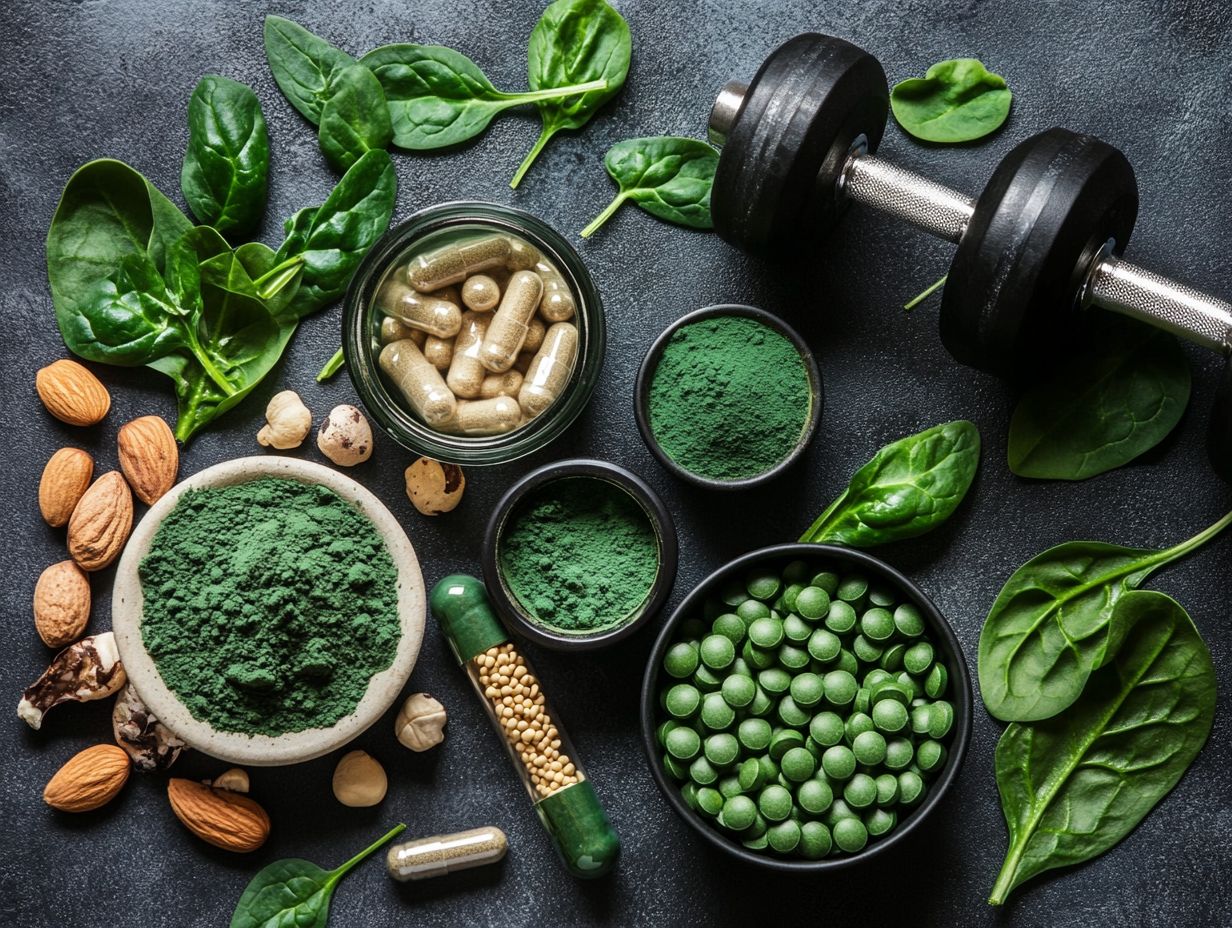 Building and repairing muscle tissue is essential for everyone engaged in resistance training or high-intensity exercise, and certain vegan supplements can support this process. Essential Amino Acids (EAAs) are crucial for muscle protein synthesis, serving as the building blocks for new muscle tissue. Without adequate intake of these important nutrients, recovery from exercise can be delayed, leading to slower muscle growth and an increased risk of injury. Unlike animal-based proteins, which typically provide a complete amino acid profile, vegan sources must be carefully planned to ensure that all essential amino acids are obtained. For instance, legumes such as lentils and beans are rich in protein but may lack certain amino acids, which can be supplemented by incorporating grains like quinoa or brown rice. Additionally, nuts and seeds can help diversify the intake of amino acids.
Building and repairing muscle tissue is essential for everyone engaged in resistance training or high-intensity exercise, and certain vegan supplements can support this process. Essential Amino Acids (EAAs) are crucial for muscle protein synthesis, serving as the building blocks for new muscle tissue. Without adequate intake of these important nutrients, recovery from exercise can be delayed, leading to slower muscle growth and an increased risk of injury. Unlike animal-based proteins, which typically provide a complete amino acid profile, vegan sources must be carefully planned to ensure that all essential amino acids are obtained. For instance, legumes such as lentils and beans are rich in protein but may lack certain amino acids, which can be supplemented by incorporating grains like quinoa or brown rice. Additionally, nuts and seeds can help diversify the intake of amino acids.
2. Increasing Energy and Endurance
Increasing energy and endurance is crucial for athletes aiming to enhance their performance in both training and competition. Several vegan supplements can assist in achieving this goal.
- Beetroot juice, for instance, is beneficial for athletes due to its high nitrate content, which is converted to nitric oxide in the body. This process dilates blood vessels and enhances blood and oxygen flow to the muscles, enabling longer periods of exercise.
- Additionally, branched-chain amino acids (BCAAs) help reduce muscle pain and fatigue, which can accelerate recovery time and boost endurance during extended training sessions.
- Athletes often find that taking creatine in a loading phase, followed by a maintenance dose, yields the best results by quickly saturating muscle stores.
- Furthermore, the pre-workout effects of beta-alanine are maximized when the supplement is taken approximately 30 minutes before exercise, as it helps buffer lactic acid, allowing athletes to complete longer intervals with reduced discomfort.
3. Reducing Inflammation and Muscle Soreness
Vegan supplements play a crucial role in reducing inflammation and alleviating muscle soreness following intense exercise sessions, which is essential for proper recovery. Omega-3 supplements derived from algae are known for their anti-inflammatory properties, helping to ease soreness and accelerate recovery times. This enables athletes to return to their training regimens more quickly and effectively, ultimately promoting ongoing muscle growth. Research studies have demonstrated that omega-3 fatty acids significantly influence inflammatory responses. For instance, one study found that participants who supplemented with omega-3s experienced a notable reduction in inflammatory markers compared to those who did not. With the right supplementation, individuals can not only relieve muscle discomfort after workouts but also enhance overall joint health. Incorporating algae-based omega-3 supplements into a vegan diet can easily fulfill nutritional requirements. It is recommended to start with a daily dose of approximately 500 to 1,000 milligrams to ensure the optimal delivery of nutrients necessary for effective recovery.
Are There Any Risks or Side Effects of Vegan Supplements for Muscle Growth?
Vegan supplements for muscle growth can offer significant benefits; however, there are risks and side effects associated with their use. Some individuals may experience allergies or intolerances to specific ingredients found in plant-based supplements, which can lead to adverse health effects. Moreover, certain supplements may interact with medications or have contraindications that should be carefully considered before incorporating them into a diet.
1. Allergies or Intolerances
Allergies and intolerances present significant challenges for individuals who use vegan supplements for muscle growth. Certain ingredients in these supplements can trigger harmful reactions in sensitive individuals. Common allergens, such as soy, gluten, or nuts, found in some protein powders can cause reactions that vary from mild to severe. These realities highlight the importance of carefully selecting supplements. Additionally, some individuals may have sensitivities to ingredients like peas or rice, which are also common sources of plant protein in vegan supplements. When choosing vegan supplements, it is essential to seek hypoallergenic options that explicitly state they are free from the most common allergens. This can often be confirmed by thoroughly reading product labels to understand the specific ingredients in each product. Consulting with healthcare professionals can provide individuals with personalized advice and recommendations, helping them avoid problematic reactions while still achieving their dietary goals.
2. Interactions with Medications
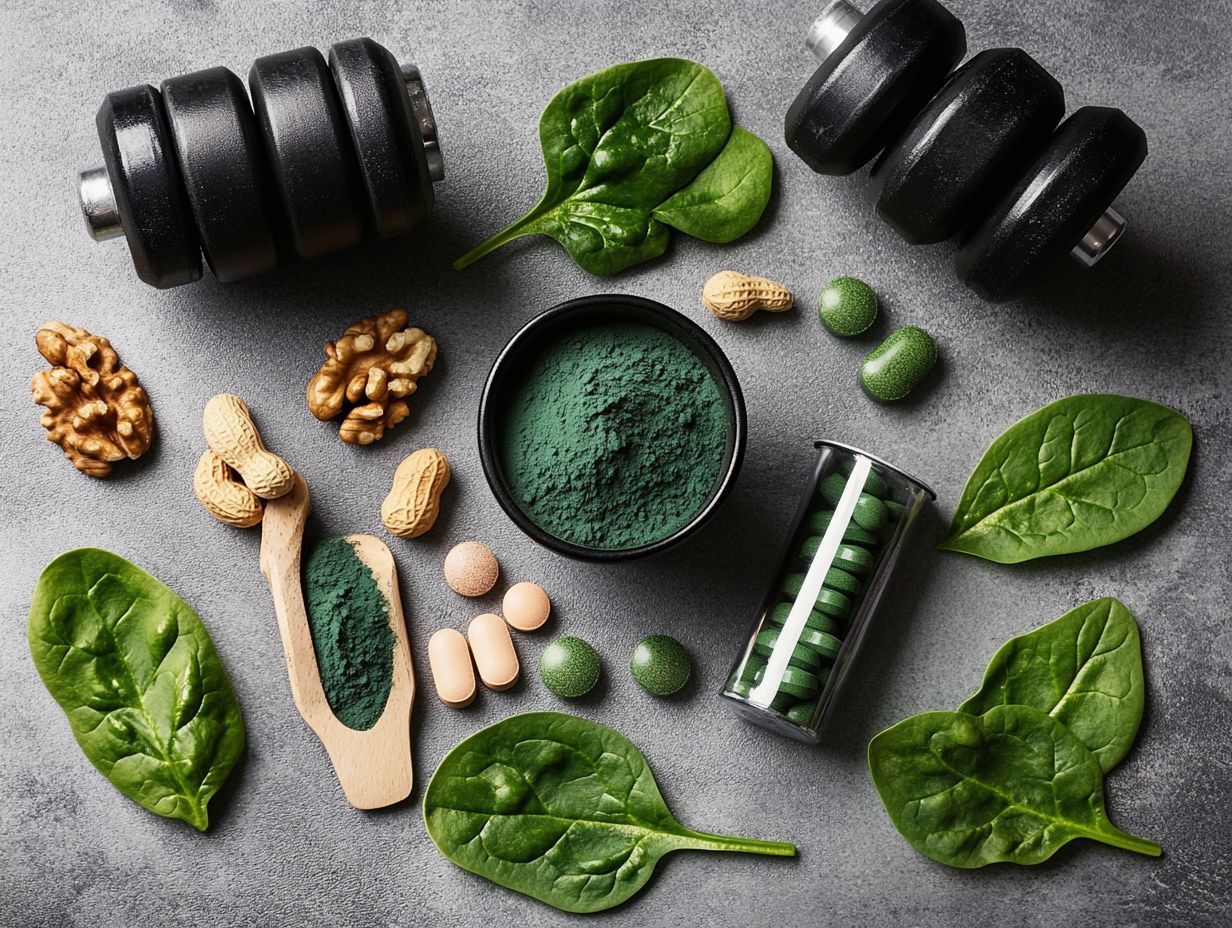 It is crucial for individuals to be aware of the potential interactions between vegan supplements and medications before starting a supplementation program. Some supplements can impact the effectiveness of medications or cause adverse reactions, making it essential to consult with a healthcare professional before incorporating them into the diet, especially for those on prescription medications or with pre-existing health conditions. For instance, certain herbal supplements, such as St. John’s Wort, can interact with antidepressants and diminish their effectiveness, potentially leading to a worsening of symptoms. Omega-3 fatty acids, often used to enhance heart health, may interact with anticoagulant medications and increase the risk of bleeding. Additionally, caution should be exercised with iron supplements, as they can interact with specific antibiotics, reducing their efficacy. Examples like these underscore the importance of seeking professional guidance to ensure the safest and most effective approaches to health, facilitating better medication management and an improved quality of life.
It is crucial for individuals to be aware of the potential interactions between vegan supplements and medications before starting a supplementation program. Some supplements can impact the effectiveness of medications or cause adverse reactions, making it essential to consult with a healthcare professional before incorporating them into the diet, especially for those on prescription medications or with pre-existing health conditions. For instance, certain herbal supplements, such as St. John’s Wort, can interact with antidepressants and diminish their effectiveness, potentially leading to a worsening of symptoms. Omega-3 fatty acids, often used to enhance heart health, may interact with anticoagulant medications and increase the risk of bleeding. Additionally, caution should be exercised with iron supplements, as they can interact with specific antibiotics, reducing their efficacy. Examples like these underscore the importance of seeking professional guidance to ensure the safest and most effective approaches to health, facilitating better medication management and an improved quality of life.
How Do You Incorporate Vegan Supplements into Your Diet for Muscle Growth?
Incorporating vegan supplements into your diet for optimal muscle growth is a personalized process that should take into account your specific nutritional needs and fitness goals. It is essential to seek personalized guidance from a registered dietitian on how to effectively integrate these supplements into your diet. This approach is crucial for maintaining a balanced and nutritionally adequate diet, which can maximize the benefits of supplementation for muscle recovery and growth.
1. Consult with a Registered Dietitian
Consulting with a registered dietitian is an invaluable step for individuals looking to incorporate vegan supplements into their diet for muscle growth. A qualified dietitian can assess your nutritional status, dietary habits, and fitness goals, providing personalized recommendations that ensure you meet your protein intake requirements, prevent vitamin B12 deficiency, and fulfill your overall nutrient needs. This professional guidance can help prevent nutrient deficiencies and enhance muscle recovery outcomes. By understanding each individual’s unique health profile and lifestyle preferences, dietitians can develop tailored supplementation strategies that align with specific vegan lifestyle needs. This customized approach not only improves the effectiveness of supplementation by incorporating plant-based protein and essential amino acids but also promotes a more sustainable and enjoyable dietary experience. Continuous nutritional education from a dietitian enables individuals to make informed decisions about their food choices, fostering independence and long-term adherence to healthier eating patterns. Cultivating this knowledge is crucial, as it equips individuals with the tools necessary to adapt their diets as their health, vegan diet needs, or fitness goals evolve.
2. Read Labels and Dosage Recommendations
When incorporating vegan supplements into your muscle growth regimen, it is crucial to read labels and understand dosage recommendations. Not all supplements are created equal, so it is essential to choose high-quality products that align with your nutritional goals, like vegan protein powders and essential fatty acids. By carefully evaluating ingredient lists and adhering to dosage guidelines, individuals can optimize the effectiveness of their supplements while minimizing the risk of adverse effects. To achieve the best results, look for key ingredients such as:
- Plant-based proteins, including vegan protein sources like lentils, chickpeas, and quinoa
- Essential amino acids
- Natural sources of vitamins and minerals
It is also important to avoid potential fillers, including artificial sweeteners, preservatives, and synthetic additives, as they may compromise the purity of the supplement. Understanding proper serving sizes and following the recommended dosages can support muscle recovery, muscle repair growth, and growth without the risk of overconsumption. By taking the time to read and comprehend ingredient labels, you significantly increase your chances of selecting a beneficial supplement.
3. Incorporate Supplements into Meals or Snacks
Incorporating vegan supplements into meals or snacks can enhance overall nutrient intake and effectively support muscle growth. For example, protein powders can be added to smoothies, oatmeal, or baked goods to increase their nutritional value. Branched-chain amino acids (BCAAs) can be easily consumed by mixing them into water or other beverages during workouts. By including supplements in meals or snacks throughout the day, individuals can consistently meet their protein intake requirements and support muscle protein synthesis. Plus protein powders, omega-3 supplements, such as algae oil, can be incorporated into salads or homemade dressings to promote heart health. Nutritional yeast can be sprinkled on popcorn or pasta to provide a cheesy flavor along with a boost of B vitamins. A combination of nut butter and hemp seeds spread on whole-grain toast makes for a delicious snack that enhances the intake of essential fatty acids and protein. Maintaining a well-rounded diet of whole foods while supplementing is crucial for ensuring proper nutrient absorption, improving muscle recovery aid, and overall health.
4. Stay Consistent with Taking Supplements
Maintaining consistency in taking vegan supplements is essential for achieving optimal muscle growth and recovery results. Establishing a schedule for supplement intake ensures that the body consistently receives the necessary nutrients for muscle protein synthesis, energy production, and replenishing energy stores. Over time, this regularity can lead to enhanced strength, endurance, and athletic performance. To adhere to a supplementation schedule, several simple strategies can be employed.
- Setting reminders through smartphone apps or alarms can help ensure that vitamins and minerals, such as iron, zinc, calcium, and omega-3 fatty acids, are taken at the same time each day.
- Additionally, incorporating supplementation into existing daily routines such as enjoying a smoothie in the morning or a post-workout snack with creatine or beta-alanine can streamline the process.
- Tracking progress through a journal or app can also be beneficial, as it helps keep a record of what has been taken, including products like Promino , and provides feedback on how these nutrients are impacting performance over time, allowing for necessary adaptations.
